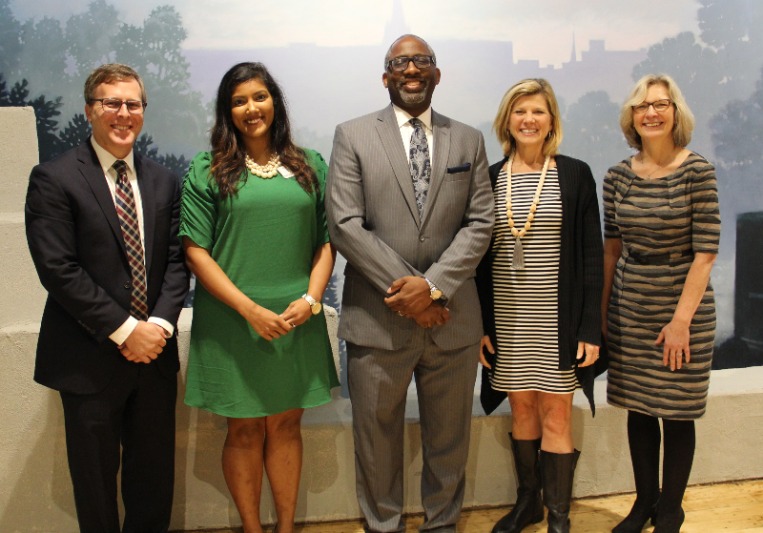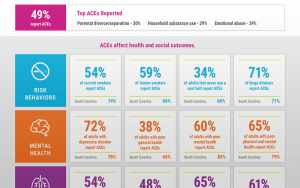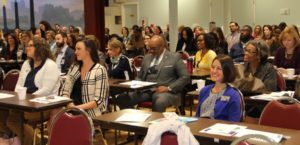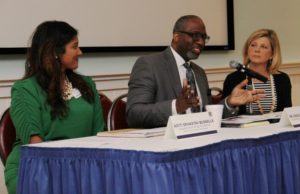A new coalition called Resilient Richland brought together community leaders and child-serving professionals for its official launch. Neil White, who tells the stories of Children’s Trust, covered the event.

(L-R) Robert Lominack, Achieve Columbia; Aditi Srivastav Bussells, Children’s Trust; Dr. Craig Witherspoon, Richland School District One; Dr. Robin Welsh, USC School of Medicine; and Anita Floyd, United Way of the Midlands
Providing a thriving community where healthy children and families are safe, supported and able to achieve their full potential in life is no longer just a concept in Richland County.
Resilient Richland, led by United Way of the Midlands and funded by the Nord Family Foundation, held a recent kick-off to introduce the initiative and coalition of 40 community partners.

The work, an offshoot of the S.C. Adverse Childhood Experiences Initiative led by Children’s Trust, has a goal to reduce toxic stress and the long-term effects of adversity through trauma awareness, education and intervention.
The coalition brings together community leaders in health care, education, business, government and faith-based fields to inform them on the best methods to build resilience through both the prevention and treatment of toxic stress. According to Anita Floyd, senior vice president of community impact and strategic implementation for United Way of the Midlands, the first step is identifying the many professionals and volunteers who interact with children.
ACE Initiative Plays Broad Role
Aditi Srivastav Bussells, Children’s Trust research and community impact manager, points to how the ACE Initiative can help local communities like Richland County tackle the far-reaching negative impact of childhood adversity.
“ACEs are an easy concept: what happens to you in childhood affects your adulthood, and now we have science, the training and the data to help support it,” Bussells said. “Our initiative focuses on the notion that we can prevent not only the long-term consequences of ACEs, but we can keep them from happening in the first place — and we can do this by mobilizing our community to make data-informed decisions that help change our norms, our programs, and our policies around how we respond to and address traumatic events.”

Research shows that children who are exposed to trauma like physical and emotional abuse, divorce, substance use/misuse, domestic violence and mental illness are much more likely to become adults with problems like depression, alcoholism, obesity, heart and liver disease, and decreased workplace performance. By addressing the issues of childhood abuse and family dysfunction on the front end, a multitude of health and social problems later in life can be prevented.
Bussells, who has worked in the field of ACEs for five years and is completing her doctorate at the USC Arnold School of Public Health, is leading the S.C. ACE Initiative for Children’s Trust. As the state’s leader in child abuse prevention, Children’s Trust is bringing together a network of people committed to improving health and well-being in every community. The ACE Initiative has built a core of 70-plus master trainers who can reach out to different groups across South Carolina to talk about ACEs and explain how the organization is collecting and disseminating data, building a prevention planning framework, and promoting sound legislative policy to address ACEs in our communities.
The trainers educate community leaders, policymakers, and businesspeople about the need to build resilience among children and families, which blends perfectly with the work of Resilient Richland, whose leaders are using ACE data and tools to help inform their work on a local level.

Community members gathered to hear the panel discussion at the launch of Resilient Richland.
“Resilient Richland has the unique opportunity to set the standard for the rest of South Carolina,” Bussells said. “Becoming a trauma-informed county means that each of our sectors are actively promoting the well-being of our community, which in turn will help our children meet their full potential. We are excited for the collaboration with United Way and the local Richland community to ensure our children, families and communities are thriving.”
Bussells discussed the importance of having the entire community on board, ranging from service providers to everyday folks.
“ACEs aren’t just something you care about if you work with kids,” she said. “ACEs are something you care about if you care about people, and you care about your community.”
Community Experts Provide Insights
At a recent launch event for Resilient Richland, Bussells joined a panel discussion that featured Dr. Craig Witherspoon, Richland School District One superintendent, and Dr. Robin Welsh, board-certified child and adolescent psychiatrist, USC School of Medicine faculty member, and director of developmental pediatrics with the Palmetto Health-USC Medical Group. The discussion was moderated by Robert Lominack, an attorney and co-founder of Achieve Columbia, a nonprofit focused on developing long-term relationships with at-risk middle and high school students and their families.

A panel discussion highlighted what it’s going to take to build resilience in Richland County.
The conversation revolved around the things that can make a difference in the lives of children and families to foster resilience. Welsh discussed the importance of after-school programs at community centers, which might offer parenting skills classes or child activities involving sports or music. She added that a small adult-to-student ratio in those activities is a key component.
“That gives the children more self-esteem just knowing that someone cares about them. The adults really get to know them,” Welsh said.
Witherspoon also talked about the power of a caring adult in a child’s life, whether that’s a teacher or guidance counselor or bus driver. He touted Richland One’s forward progress on establishing trauma-informed practices and mentoring programs within individual schools.
In his days as a lawyer representing men on death row, Lominack saw the devastating impact of childhood trauma on their lives. He has come to embrace the information and data around ACEs that can play a part in preventing those negative health and social outcomes into adulthood.
Floyd touted a number of steps that Resilient Richland will enact as it gets underway. They include a community awareness campaign that highlights the costs and impact of trauma as well as the adoption of communitywide prevention programs. Children’s Trust, for instance, implements home visiting programs, the Strengthening Families Program, and Triple P (Positive Parenting Program) with local partners across the state.
Learn more about Resilient Richland.
Learn more about the S.C. ACE Initiative.
Learn more about ACEs in Richland County (PDF).
Learn more about child well-being in Richland County (PDF).
Photos in the story courtesy of United Way of the Midlands.






